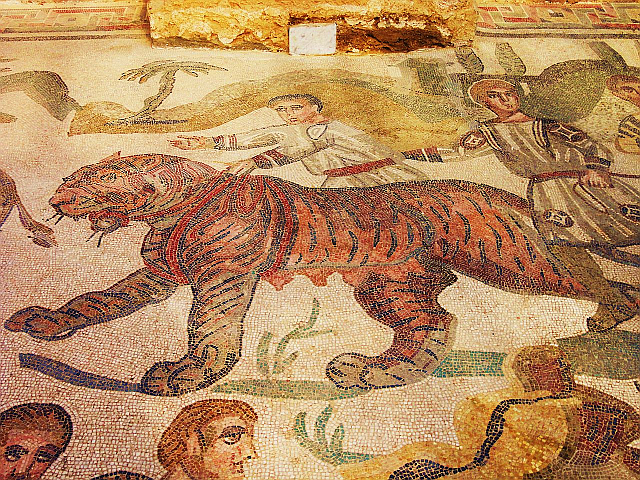Ovid's letter from Deianira to Hercules (Heroides #9) recounts the standard list of the hero's mighty deeds:
Deianira goes further than the painter to imagine the Lydian nymph in an exchange of Hercules' famed attire:
Before he dons the shirt of Nessus, Heracles is already sizzling. Prior to putting on the blood-smeared texta, Ovid finds the poetic equivalent of the Lernaean Hydra's blood in the caustic sarcasm of Deianira's text:
. . . of enormous serpents, throttled and coiling their lengths about your infant hand; how the Tegeaean boar has his lair on cypress-bearing Erymanthus, and afflicts the ground with his vast weight. You do not omit the skulls nailed up in Thracian homes, nor the mares made fat with the flesh of slain men; nor the triple prodigy, Geryones, rich in Iberian cattle, who was one in three; nor Cerberus, branching from one trunk into a three-fold dog, his hair inwoven with the threatening snake; nor the fertile serpent that sprang forth again from the fruitful wound, grown rich from her own hurt; nor him whose mass hung heavy between your left side and left arm as your hand clutched his throat; nor the equestrian array that put ill trust in their feet and dual form, confounded by you on the ridges of Thessaly. (Showalter translation, 85ff).Only here, the hero, dressed as a slave girl at the feet of Omphale, is the one speaking them . . .
Deianira goes further than the painter to imagine the Lydian nymph in an exchange of Hercules' famed attire:
These deeds can you recount, gaily arrayed in a Sidonian gown? Does not your dress rob from your tongue all utterance? The nymph-daughter of Jardanus has even tricked herself out in your arms, and won famous triumphs from the vanquished hero. Go now, puff up your spirit and recount your brave deeds done; . . . O shame, that the rough skin stripped from the flanks of the shaggy lion has covered a woman’s delicate side! You are mistaken, and know it not – that spoil is not from the lion, but from you; you are victor over the beast, but she over you. A woman has borne the darts blackened with the venom of Lerna, a woman scarce strong enough to carry the spindle heavy with wool; a woman has taken in her hand the club that overcame wild beasts, and in the mirror gazed upon the armor of her lord!The queen's scathing image combines moral force with witheringly vivid reflection. The imagined mirror in which Omphale admires herself is designed to burn Heracles' conscience to the ground.
Before he dons the shirt of Nessus, Heracles is already sizzling. Prior to putting on the blood-smeared texta, Ovid finds the poetic equivalent of the Lernaean Hydra's blood in the caustic sarcasm of Deianira's text:


